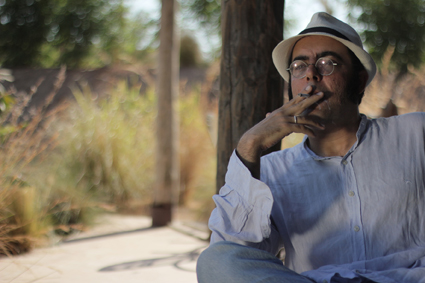Mohamed Abdelkarim |
The Egyptian artist Mohamed Abdelkarim shows an installation titled Comparison of Appearance that circles around the controversial Egyptian ideologist, author, and intellectual Sayyid Qutb and his trip to the United States from 1948 to 1949, which changed his political convictions fundamentally. Qutb, best known today as the thinker who conceived jihadism, was also a writer and critic of capitalism in the age of the Cold War and the last phase of colonialism. To this day, his writings shape the discourse in Egypt (and elsewhere) on dealing with the West. Abdelkarim’s interest is not in Qutb himself, but in the historical forces and patterns that congealed in his influence:
“Qutb’s experiences with colonialism, connected with enormous changes in Egyptian society as a result of foreign rule, reflect the experiences of many in his generation. In my artistic work, I am not so much interested in the details of Qutb’s personality … but rather in Qutb as a sociological phenomenon that can be understood from various viewpoints.”
Abdelkarim’s three-part work (consisting of a video, a book and various objects) explores how societal ideas and orders effuse, are transformed, and are inscribed in collective memory. Abdelkarim’s work ranges far beyond the protagonist Qutb and confronts the viewer with an artistic re-interpretation of a whole era.
“Qutb’s experiences with colonialism, connected with enormous changes in Egyptian society as a result of foreign rule, reflect the experiences of many in his generation. In my artistic work, I am not so much interested in the details of Qutb’s personality … but rather in Qutb as a sociological phenomenon that can be understood from various viewpoints.”
Abdelkarim’s three-part work (consisting of a video, a book and various objects) explores how societal ideas and orders effuse, are transformed, and are inscribed in collective memory. Abdelkarim’s work ranges far beyond the protagonist Qutb and confronts the viewer with an artistic re-interpretation of a whole era.
Comparison of Appearance [3:19' from 17:30'] (c) Mohamed Abdelkarim
Abdelkarim’s work is based on a collaboration with Bettina Gräf researcher in Islamic Studies at Zentrum Moderner Orient Berlin, conducting research on publishing houses in Egypt in the 1940s and 1950s, and on the concept of Islam as a political system and ideology at the beginning of the Cold War.



